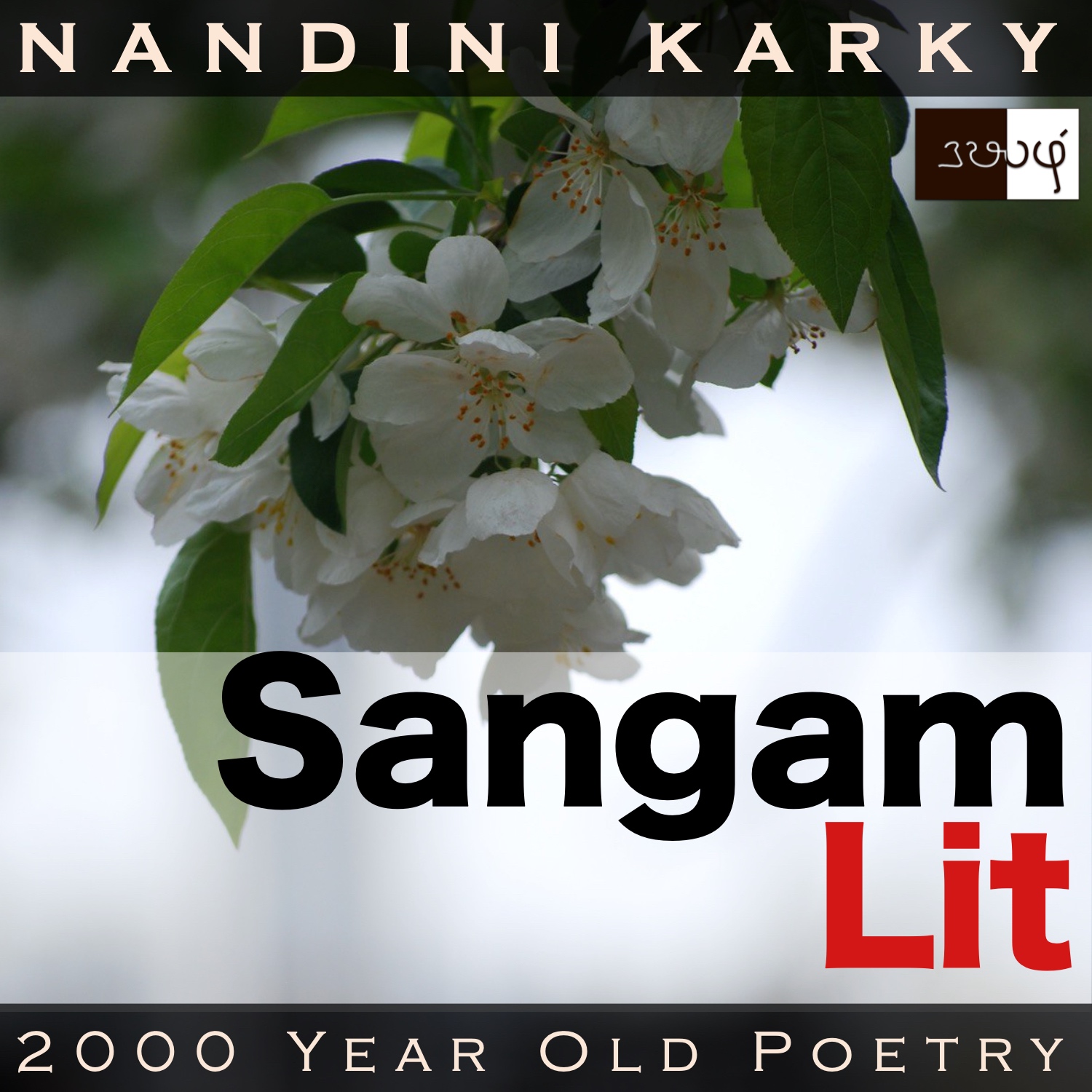Podcast: Play in new window | Download
Subscribe: Apple Podcasts | Spotify | Amazon Music | Android | iHeartRadio | TuneIn | RSS | More

In this episode, we perceive a moment of acceptance, as depicted in Sangam Literary work, Natrinai 266, penned by Kachipettu Ilanthachanaar. Set in the forest regions of ‘Mullai’, the verse speaks in the voice of the confidante to the man, agreeing to his decision to part away on a mission.
கொல்லைக் கோவலர் குறும்புனம் சேர்ந்த
குறுங் காற் குரவின் குவி இணர் வான் பூ
ஆடுடை இடைமகன் சூடப் பூக்கும்
அகலுள் ஆங்கண் சீறூரேமே;
அதுவே சாலும் காமம்; அன்றியும்,
எம் விட்டு அகறிர்ஆயின், கொன் ஒன்று
கூறுவல்-வாழியர், ஐய!-வேறுபட்டு
இரீஇய காலை இரியின்,
பெரிய அல்லவோ, பெரியவர் நிலையே?
Starting with ‘கொல்லைக் கோவலர்’ meaning ‘herdsmen of the woods’, the poem establishes the setting of the song. We meet with ‘குறுங் காற் குரவு’ or ‘the small-trunked bottle-flower tree’ in this little forest. The bright ‘white flowers’ of this tree are described as ‘வான் பூ’. The phrase ‘ஆடுடை இடைமகன் சூடப் பூக்கும்’ meaning ‘flower that blooms to be worn by a goatherd’ establishes the core of this verse. ‘இரீஇய காலை’ brings forth ‘the morning of parting away’ and outlines the events that are about to transpire. The verse finishes pithily with the words ‘பெரிய அல்லவோ, பெரியவர் நிலையே’ meaning ‘isn’t greatness the right state of the great?’ A cryptic question that propels us to know more.
The man and lady had been leading a happy, married life when the man found himself compelled to leave the lady on a mission. Fearing the pain he will evoke in the lady by this decision, the man approaches the lady’s confidante with this news. On hearing this, the confidante says, “In the narrow forests of the woodland cattle-herders, stands a short-trunked ‘kuravu’ tree with a cluster of white flower buds, in this tiny hamlet with wide spaces. These flowers bloom only to be worn by the young goatherd. That is fitting and to live in this village with you, is all that we wish for too. Nevertheless, if you decide to leave us and part away, let me tell you one thing, futile as it may be. Long live, sir! Even though the morning you move away makes our suffering soar, isn’t it the duty of the great to persevere with their innate greatness?” With these words, the confidante accepts the man’s decision to part away and promises him that she will help the lady bear this burden.
Now, for the nuances! The confidante starts by describing the hamlet the man and lady live in. It’s a forest country. Unlike mountain jungles, these forests are not expansive but rather narrow. In these narrow woods, the domain of herdsmen, the confidante makes the spotlight fall on a single tree. This is the ‘Kuravam’ or ‘Kuravu’ tree, with a short torso, and fragrant white flowers that bloom in clusters. The confidante says the only reason these flowers bloom is so that they would be worn by a goatherd. Let’s take a moment to absorb this flower’s intention before we proceed and return to this, a moment later. The confidante mentions this tree and its flowers as though describing the village that the man has brought the lady to live in. She adds that all the lady wants is to lead a life together with the man in his village in the woods. Then, she places the ‘however’ in her narration. Still, if the man decides to part away from the lady, it’s true that when he’s away the lady will suffer in pining. But then, the confidante finishes her statement by not asking the man to give up his decision to travel but instead stating that the great will do what the great should do!
What does the confidante mean by this puzzle-like statement? She is explaining that just as the man’s duty was to gather wealth and fame, the lady’s duty was to persevere with patience and bear the burden of the man’s parting away. The lady, who is born from a noble family, is sure to do the noble thing in supporting the man as he decides to journey forth, the confidante assures. Returning to that statement about a flower being born just to be claimed by a goatherd, the verse outlines the state of a woman then, who was imagined to be born only to be claimed by a man and bring happiness to him. Although this concept of a woman’s life being at the mercy of a man’s decisions is not palatable to us in this age, there is something more positive that can be gathered from this verse. The gracefulness with which an inevitable event is accepted, and the way in which all that is good within is summoned to bear with an unexpected burden, shows the way even today!




Share your thoughts...